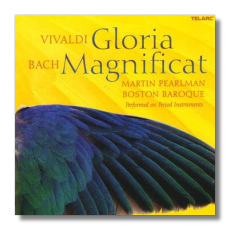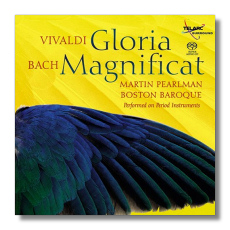
The Internet's Premier Classical Music Source
Related Links
-
J.S. Bach Reviews
Vivaldi Reviews - Latest Reviews
- More Reviews
-
By Composer
-
Collections
DVD & Blu-ray
Books
Concert Reviews
Articles/Interviews
Software
Audio
Search Amazon
Recommended Links
Site News
 CD Review
CD Review
Boston Baroque

- Antonio Vivaldi: Gloria in D Major, RV 589
- Johann Sebastian Bach: Magnificat in D Major, BWV 243
Tamara Matthews, soprano
Deanne Meek, mezzo-soprano
Mary Phillips, alto
Don Frazure, tenor
Stephen Powell, baritone
Boston Baroque/Martin Pearlman
Telarc CD-80651 DDD 53:19
Also released on Hybrid Multichannel SACD SACD-60651
Amazon
- UK
- Germany
- Canada
- France
- Japan
- ArkivMusic
- CD Universe
This new CD, Boston Baroque's sixteenth for Telarc, couples two of the Baroque era's most popular shorter choral works – both of them in D Major! They are nicely contrasted. Vivaldi's Gloria is characterized by its Italian warmth, fluidity, and bouncy personality, while the Bach is more formal, architectural, and more emotionally and texturally varied. The Magnificat contains one of the era's most common musical puns: at the end of the work, when the chorus sings "Sicut erat in principio," ("As it was in the beginning"), Bach reprises the music heard at the very beginning of the Magnificat.
These are period instrument performances. Many listeners will not even realize the difference – no hair shirt here! With Boston Baroque, anyway, enjoyment never needs to be sacrificed to authenticity. Pearlman favors fairly quick tempi. The "Et exsultavit" from Bach's Magnificat, for example, is moved along briskly, as if it were a Courante from one of the composer's cello suites, and the phrasing is so crisp that it almost feels clipped. The "Quia fecit" receives a similar treatment; it is almost jaunty here! At these tempi, it can be difficult for singers to articulate their long runs cleanly – for example, in the tenor's imperious "Deposuit" – but they all keep up. The slower sections are done feelingly, but without any lingering or sentimentality. The "Suscepit Israel," a trio for the three women, is surpassingly lovely.
The chorus in the Vivaldi includes six sopranos, five altos, five tenors, and four basses. Pearlman adds two sopranos and an extra alto for the Bach. The smaller size lends flexibility, and the group's timbre is young and refreshing, although the incisiveness of their attacks can almost sound aggressive at times. There are 26 instrumentalists, and there's nothing abrasive or unsteady about their playing, which goes to show how much period performance has advanced in the last two or three decades.
The recording venue was Mechanics Hall in Worcester, Massachusetts. The sound is sufficiently "live" to suggest the interior of a medium-sized church, but without the attendant muddiness.
All in all, these performances are relatively objective, and they rest joyously and comfortably on the ear. While there are many competitive recordings, especially of the Bach, Pearlman and Boston Baroque offer an excellent alternative for those who want to hear the music played cleanly, brightly, and authentically. I must complain, though, that 53 minutes is a bit short for a CD.
Copyright © 2006, Raymond Tuttle





















